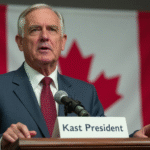Background and Relevance of Donald Trump
Donald Trump, the 45th President of the United States, served from January 2017 to January 2021. Known for his aggressive approach to executive power, Trump’s economic and trade policies significantly impacted global commerce. One of his most contentious initiatives was the imposition of global tariffs, which have been a subject of legal scrutiny and debate.
Legal Challenge Against Trump’s Tariffs
On September 9, the US Supreme Court announced it would hear arguments regarding the legality of Trump’s global tariffs on November 5. This case is a crucial test for one of Trump’s most assertive exercises of executive power, central to his economic and trade agenda.
Lower Court’s Decision
A lower court previously ruled that Trump had overstepped his authority by imposing most of the tariffs under a federal law intended for emergency situations. This decision stemmed from lawsuits filed by small businesses and 12 US states, mostly governed by Democrats:
- Arizona
- Colorado
- Connecticut
- Delaware
- Illinois
- Maine
- Minnesota
- Nevada
- New Mexico
- New York
- Oregon
- Vermont
Additional Tariff Case
The Supreme Court will also review another tariff challenge by a family-owned toy company, Learning Resources, concurrently with the Trump tariff case.
Impact of Trump’s Tariffs
Trump’s tariffs are part of a global trade war he initiated upon returning to the presidency in January. This approach has strained relationships with trading partners, increased market volatility, and fueled global economic uncertainty.
Trump has leveraged tariffs as a key tool in his foreign policy, using them to renegotiate trade deals, secure concessions, and exert political pressure on other nations.
Legal Basis for Tariffs
The US Court of Appeals for the District of Columbia Circuit ruled on August 29 that Trump exceeded his authority by invoking the International Emergency Economic Powers Act (IEEPA) of 1977 to impose tariffs. Despite this ruling, the tariffs remain in effect during the Supreme Court appeal process.
Key Questions and Answers
- What are the tariffs in question? The tariffs imposed by Donald Trump as part of his aggressive trade policies during his presidency.
- Who challenged these tariffs? Small businesses and 12 US states, mostly governed by Democrats, filed the lawsuits.
- Why is this case important? It tests the extent of executive power in trade policy, which has been central to Trump’s economic agenda.
- What is the legal basis for the challenge? Trump’s use of the International Emergency Economic Powers Act (IEEPA) to impose tariffs was deemed an overreach by a lower court.
- What is the current status of the tariffs? Although legally challenged, the tariffs remain in effect while the case proceeds to the Supreme Court.






